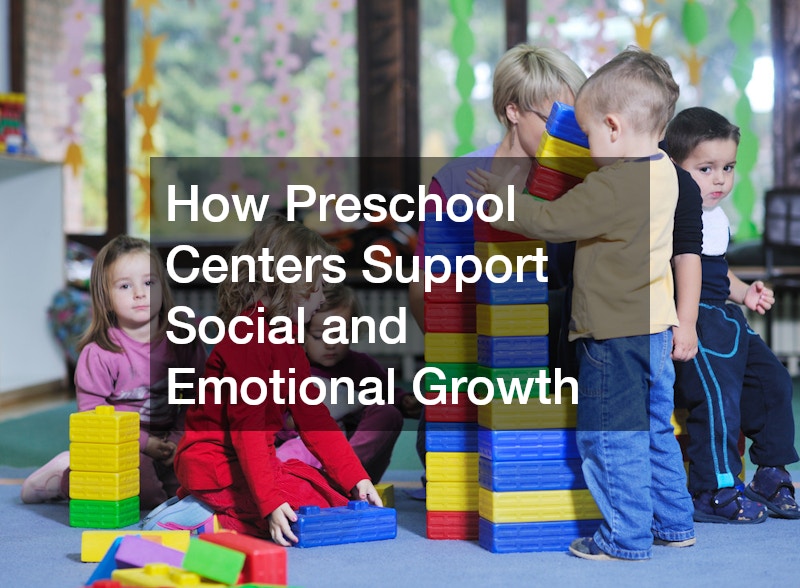
Preschool centers play a significant role in the early stages of a child's development. They are often the first structured environment where children begin to learn not only academic skills but also vital social and emotional skills that lay the foundation for their future. This article explores how preschool centers contribute to the social and emotional growth of young children by answering some of the most common questions parents and educators have on this topic.
Video Source
In preschool centers, children engage in numerous group activities that form the basis of peer interaction and collaboration. They learn the importance of working together and turn these early experiences into lifelong skills of cooperation and teamwork.
Activities such as building blocks, group art projects, and organized games help children learn to share materials and space. These dynamics teach patience and the joy of achieving goals collectively, laying the groundwork for future social settings.
Importantly, these interactions also involve conflict resolution, where instructors guide children through the process of finding amicable solutions. Through play and structured activities, children learn to navigate disagreements in a constructive manner.
Preschools provide children with unique opportunities to enhance verbal and non-verbal communication skills in a supportive environment. Teachers often use storytelling sessions that promote language development and allow children to express themselves and interpret others effectively.
Children refine their listening skills by participating in group activities where instructions are vital, enhancing comprehension and retention. This prepares them for future academic settings where understanding and following complex directions will be crucial.
Interactive sessions facilitated by teachers help children articulate their thoughts and emotions, fostering confidence and a growing vocabulary. These skills translate into an ability to engage socially, bridging gaps between diverse groups as they grow.
Preschool environments are carefully crafted to bolster children's self-esteem and confidence through positive reinforcement and encouragement. When children accomplish tasks, no matter how small, they receive affirmation that helps solidify a robust sense of self-worth.
Through various activities, children learn to recognize their capabilities and develop the courage to try new tasks and face challenges, seeing mistakes as learning opportunities. These foundational experiences influence their resilience in the face of future challenges.
Furthermore, the nurturing relationships they form with their peers and teachers offer a supportive network that reinforces the confidence learned within a preschool setting. These connections serve as a model for building positive relationships throughout their lives.
Preschool is crucial in teaching children how to understand and express emotions constructively. Through creative activities, such as art and role-playing, children learn about different emotions by seeing them depicted and acting them out.
Emotional coaching provided by teachers helps children identify their emotions and express them in appropriate ways. With teacher guidance, children learn to empathize with others' feelings, forming a foundation for emotional intelligence.
Preschools often incorporate songs and games that teach children to communicate emotions verbally and non-verbally. Mastering these emotional skills enables children to express needs and foster emotional resilience effectively in future situations.
Teachers in preschool centers are pivotal in creating a nurturing environment where social and emotional learning thrives. They offer stability and safety, which are crucial for children to feel secure and willing to engage in new experiences.
By establishing routines and clear expectations, teachers ensure children understand boundaries and respect them, which promotes a sense of belonging. This structure is vital as it mirrors future structured environments children will encounter.
The teachers' continual positive reinforcement and attention to each child's unique needs empower students to express themselves freely. This foundational relationship aids in emotional development and helps establish a positive learner identity.
Preschool teachers serve as role models, demonstrating positive social interactions and emotional resilience. Their behavior sets a standard for children to emulate in their interactions with others.
Teachers intentionally incorporate lessons about kindness, empathy, and problem-solving into daily activities, setting examples through their behavior. This consistent modeling helps children internalize these values, which they carry into future social interactions.
In this supportive atmosphere, children learn social cues and the significance of mutual respect, shaping their behaviors beyond preschool walls. Such role modeling profoundly influences children's social skills and emotional management as they grow.
Preschool centers serve as the cornerstone for early social and emotional development, providing children with essential skills that will support their growth throughout life. Through structured environments, dedicated teachers, and engaging activities, preschools help children learn to manage emotions, interact socially, and build self-confidence, setting the groundwork for successful future interactions and emotional well-being.
